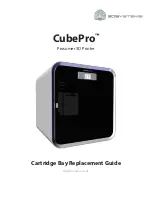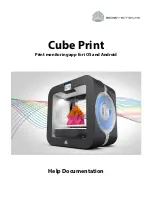
Operating Manual for 3D Printer BT1.2
9
cause of the danger themselves must take measures to prevent or reduce the risk of injury, fire or
other hazards.
➢
electrical appliances must be safely disconnected from the power supply before moving
3.3
People without professional electrical
qualifications
(requirements for operating equipment in terms of electrical equipment qualifications)
➢
before moving electrical equipment connected to the mains by flexible cable and a plug, safe
disconnection from the mains must be done by taking the plug out of the socket.
➢
when operating electrical equipment, the operator must observe the relevant instructions as well as
local operating regulations for its use, and also make sure that the equipment is not excessively
overloaded or otherwise damaged.
➢
maintain electrical equipment in accordance with the manufacturer's instructions
➢
only replace remelted inserts of threaded and instrument fuses with new inserts of the same value
(remelted inserts must not be repaired)
➢
when the electrical device is switched off, they can move and extend the movable leads with
connecting cables provided with appropriate connecting parts
➢
switch simple electrical devices on and off
➢
if the operator notices a fault in the equipment, e.g., damage to insulation, burning odour, smoke,
unusually noisy or shock operation of electrical equipment, strong humming, jerky start, some
electrical equipment part overheating, sparks, armour from electric current, THE ELECTRICAL
EQUIPMENT MUST BE SWITCHED OFF IMMEDIATELY!
3.4
Electrical equipment
(equipment operation requirements)
➢
DAMAGED ELECTRICAL EQUIPMENT MUST NOT BE USED!
3.5
Disposal of the product and its parts
(equipment disposal ecology)
OBSERVE APPLICABLE ECOLOGICAL REGULATIONS!
When the equipment is eventually decommissioned (at the end of its service life), bear in
mind the environmental protection and recycling options (in general):
➢
dispose of toxic waste (e.g., batteries, electronics), separate plastic materials in accordance
with regulations and offer them for recycling
➢
separate metal parts for scrapping in accordance with the type
➢
it is necessary for the facility owner to comply with the Waste Act when disposing of waste in
terms of care for healthy living conditions and environmental protection
➢
it is necessary for generated waste to be offered to waste disposal facility operators,
particularly metals, oils, lubricants, plastics, etc.










































